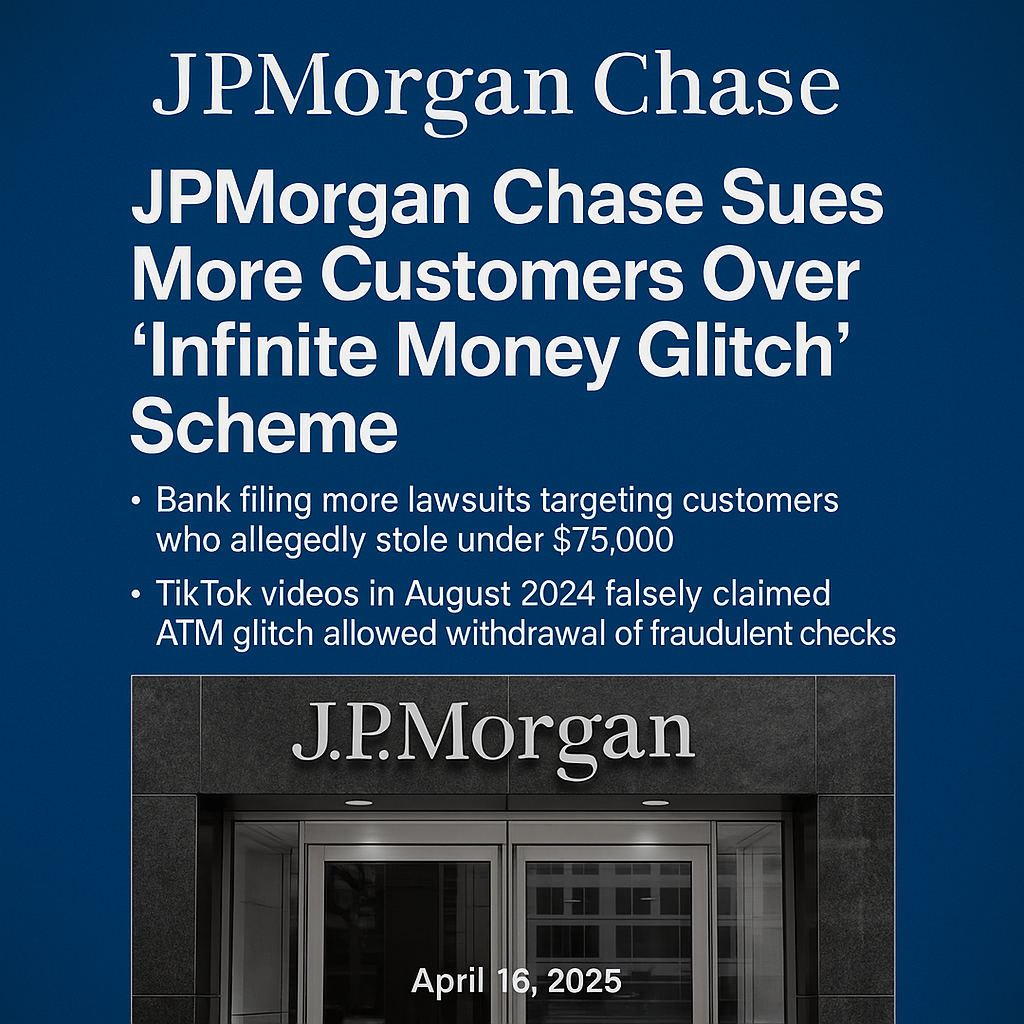JPMorgan Chase, the largest bank in the United States, is expanding its legal campaign against individuals accused of participating in the now-viral “infinite money glitch” scam, a widespread incident involving ATM check fraud that surfaced on social media in August 2024. The bank has now begun suing customers who allegedly stole under $75,000, a move that significantly broadens the scope of its recovery efforts.
What Was the Infinite Money Glitch?
The “infinite money glitch” refers to a fraudulent scheme that spread across platforms like TikTok and X (formerly Twitter), falsely claiming that users could deposit fake checks via ATMs and immediately withdraw large sums of money before the checks bounced. Videos boasting five-figure bank balances went viral, prompting hundreds of users to attempt the scam.
JPMorgan Chase has repeatedly stated that there was no system glitch. Instead, the scam relied on exploiting standard check processing delays in order to commit bank fraud.
“Regardless of what you see online, depositing a fraudulent check and withdrawing funds is fraud, plain and simple,” the bank said in a public statement.
JPMorgan Files Lawsuits in State Courts
According to sources familiar with the matter, JPMorgan Chase has sent over 1,000 demand letters since October 2024, urging customers to return stolen funds. While some complied voluntarily, others are now facing legal action. The bank is currently filing lawsuits in multiple state courts, including:
- Gwinnett County, Georgia
- Miami, Florida
- The Bronx, New York
- Various counties across Texas
These lawsuits target smaller-scale fraud cases involving under $75,000, which fall outside the jurisdiction of federal courts.
In one specific case in Georgia, JPMorgan alleges a customer deposited a fraudulent $73,000 check and made $82,599 in withdrawals before the check bounced six days later. The individual is now being sued for nearly $58,000 in losses.
Viral TikTok Bank Scam Had Real Financial Impact
The incident caused a significant financial loss for the bank and added to growing concerns about social media-fueled financial fraud. According to the Federal Trade Commission (FTC), Americans lost more than $10 billion to fraud in 2023, with check fraud surging by over 60% in 2024.
JPMorgan emphasized that it’s taking these incidents seriously to discourage future fraud attempts.
“We’re still investigating cases of fraud and cooperating with law enforcement – and we’ll do that for as long as it takes to hold fraudsters accountable,” said Drew Pusateri, spokesperson for JPMorgan Chase.
Bank Fraud and Bankruptcy: No Easy Way Out
In addition to civil lawsuits, JPMorgan is contesting bankruptcy filings by individuals accused of check fraud. In a case filed in Grand Rapids, Michigan, the bank asked for more time to object to a debtor’s attempt to discharge over $44,000 in fraudulently obtained funds.
Court documents detail how the individual made immediate cash withdrawals and peer-to-peer transfers via Cash App, allegedly with intent to conceal the funds. JPMorgan is challenging the discharge on the grounds of fraudulent behavior.
“There are legitimate reasons for bankruptcy protection, but getting rid of debts you accumulated through fraud isn’t one of them,” added Pusateri.
JPMorgan Chase’s Response to the Infinite Money Glitch
The financial institution has launched internal investigations, boosted security measures, and warned customers against attempting similar scams. Chase emphasized that social media misinformation should never be a reason to engage in illegal activity, and encouraged customers to report suspicious banking activity immediately.

